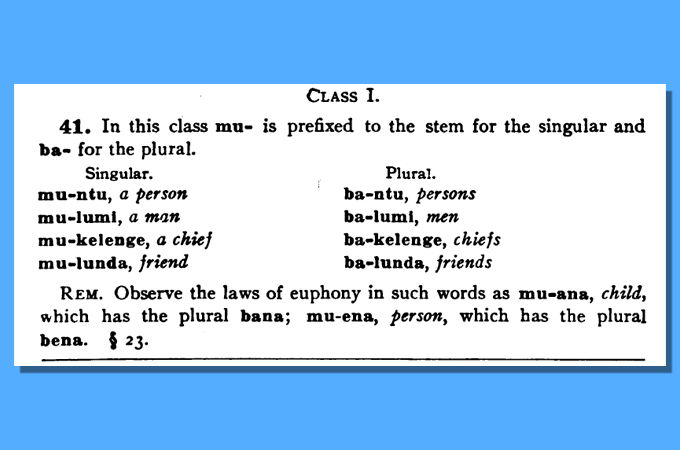Blog > Grammar > The Mu-Ba Tshiluba Noun Class

The Mu-Ba Tshiluba Noun Class
The first noun class in Tshiluba is the Mu-Ba class. It is the most commonly used and is a gateway to understanding the total of eight noun classes.
Lire En Français
 Credit: Grammar and Dictionary of the Buluba-Lulua Language - W.M. Morrison (1906)
Credit: Grammar and Dictionary of the Buluba-Lulua Language - W.M. Morrison (1906)
In Tshiluba, like most languages, there are nouns which describe people, places, or things. Nouns in Tshiluba with the prefix mu- are usually employed to describe people. In this class, mu- is prefixed to the stem for the singular ba- for plural. The table below lists some examples of Class I nouns.
| Singular |
|---|
| mu-ntu, a person mu-lume, a man mu-kaji, a woman mu-kalenge, a chief mu-loji, a witch |
| Plural |
|---|
| ba-ntu, people ba-lume, men ba-kaji, women ba-kalenge, chiefs ba-loji, witches |
Although this class of nouns is generally used to describe people, there are some words in Tshiluba that describe people without usage of the mu- prefix. The table below lists these examples.
| Singular |
|---|
| tatu, father mamu, mother baba, mother kaku, grandparent shakena, namesake manseba, uncle nsongalume, boy nsongakaji, girl mankashi, paternal aunt bukonda, brother/sister in-law mfumu, chief |
| Plural |
|---|
| batatu, fathers bamamu, mothers bababa, mothers bakaku, grandparents bashakena, namesakes bamanseba, uncles bansongalume, boys bansongakaji, girls bamankashi, paternal aunts babukonda, brothers/sisters in-law bamfumu, chiefs |
For father in-law we have tatu-muenu and for mother in-law we have mamu-muenu. There is also an elided form of mamu-muenu, which is ma'-muenu. The plural form is respectively batatu-muenu & bama-muenu.
In linguistics, an agent noun is a word that is derived from another word denoting an action, and that identifies an entity that does that action. For example, driver is an agent noun formed from the verb to drive. In some languages, there exist a masculine or feminine variation of agents, such as: actor and actress. Tshiluba agent nouns are unisex and therefore do not have separate masculine and feminine versions.
In Tshiluba, agent nouns are formed using the prefix of Class I nouns mu-, with the stem of any verb, and with the suffix -i. Agent nouns in Tshiluba follow the Class I noun rules by using the prefix ba- to denote plurality. Class I agent nouns always describe a human being and do not describe inanimate objects. Here are some examples of agent nouns in Tshiluba:
| Verb |
|---|
| ku-dim-a, to plow ku-komb-a, to sweep ku-nang-a, to love ku-pandish-a, to save ku-lamb-a, to cook |
| Agent Noun |
|---|
| mudimi, a plowman mukombi, a sweeper munangi, a lover mupandishi, a saviour mulambi, a cook |
There are many agent nouns that can develop from the Baluba people as technological advancements provide new occupations and new discoveries to employ the use of new words. In a general sense, if Class I nouns in Tshiluba continue to be formed according to the present structural rules, there will be an influx of new words and discoveries within the Baluba language space.



